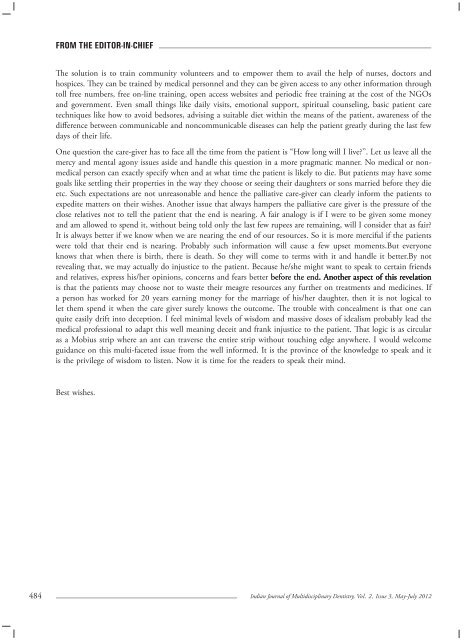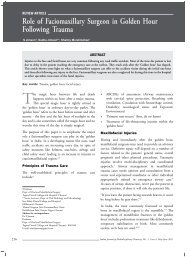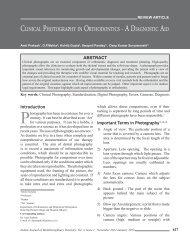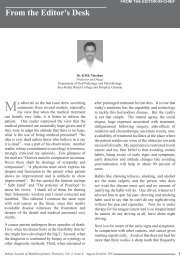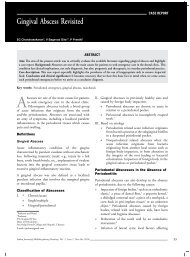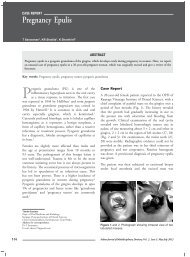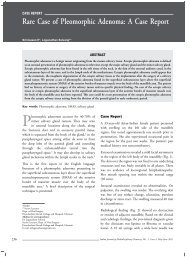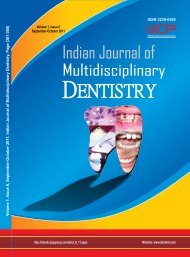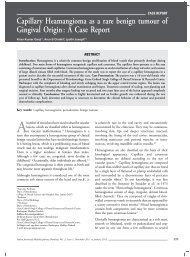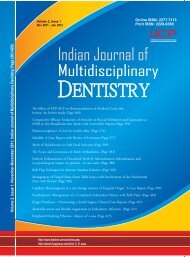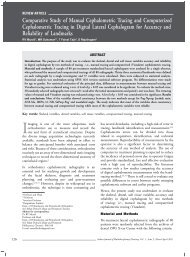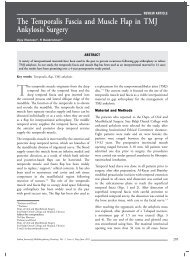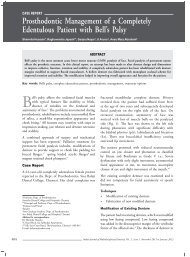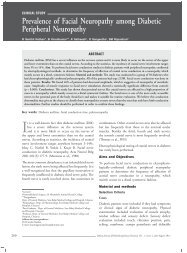Volume 2 - Issue 3 (May-Jul)
Volume 2 - Issue 3 (May-Jul)
Volume 2 - Issue 3 (May-Jul)
You also want an ePaper? Increase the reach of your titles
YUMPU automatically turns print PDFs into web optimized ePapers that Google loves.
From the Editor-in-chief<br />
The solution is to train community volunteers and to empower them to avail the help of nurses, doctors and<br />
hospices. They can be trained by medical personnel and they can be given access to any other information through<br />
toll free numbers, free on-line training, open access websites and periodic free training at the cost of the NGOs<br />
and government. Even small things like daily visits, emotional support, spiritual counseling, basic patient care<br />
techniques like how to avoid bedsores, advising a suitable diet within the means of the patient, awareness of the<br />
difference between communicable and noncommunicable diseases can help the patient greatly during the last few<br />
days of their life.<br />
One question the care-giver has to face all the time from the patient is “How long will I live?’’. Let us leave all the<br />
mercy and mental agony issues aside and handle this question in a more pragmatic manner. No medical or nonmedical<br />
person can exactly specify when and at what time the patient is likely to die. But patients may have some<br />
goals like settling their properties in the way they choose or seeing their daughters or sons married before they die<br />
etc. Such expectations are not unreasonable and hence the palliative care-giver can clearly inform the patients to<br />
expedite matters on their wishes. Another issue that always hampers the palliative care giver is the pressure of the<br />
close relatives not to tell the patient that the end is nearing. A fair analogy is if I were to be given some money<br />
and am allowed to spend it, without being told only the last few rupees are remaining, will I consider that as fair?<br />
It is always better if we know when we are nearing the end of our resources. So it is more merciful if the patients<br />
were told that their end is nearing. Probably such information will cause a few upset moments.But everyone<br />
knows that when there is birth, there is death. So they will come to terms with it and handle it better.By not<br />
revealing that, we may actually do injustice to the patient. Because he/she might want to speak to certain friends<br />
and relatives, express his/her opinions, concerns and fears better before the end. Another aspect of this revelation<br />
is that the patients may choose not to waste their meagre resources any further on treatments and medicines. If<br />
a person has worked for 20 years earning money for the marriage of his/her daughter, then it is not logical to<br />
let them spend it when the care giver surely knows the outcome. The trouble with concealment is that one can<br />
quite easily drift into deception. I feel minimal levels of wisdom and massive doses of idealism probably lead the<br />
medical professional to adapt this well meaning deceit and frank injustice to the patient. That logic is as circular<br />
as a Mobius strip where an ant can traverse the entire strip without touching edge anywhere. I would welcome<br />
guidance on this multi-faceted issue from the well informed. It is the province of the knowledge to speak and it<br />
is the privilege of wisdom to listen. Now it is time for the readers to speak their mind.<br />
Best wishes.<br />
484<br />
Indian Journal of Multidisciplinary Dentistry, Vol. 2, <strong>Issue</strong> 3, <strong>May</strong>-<strong>Jul</strong>y 2012


